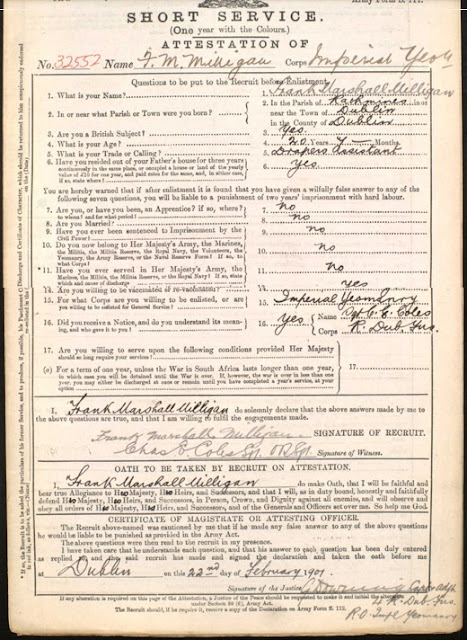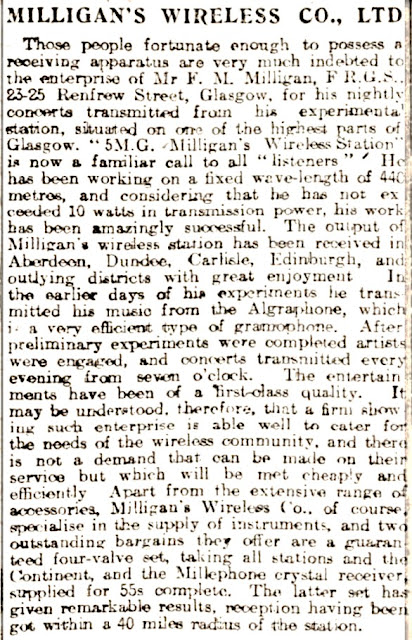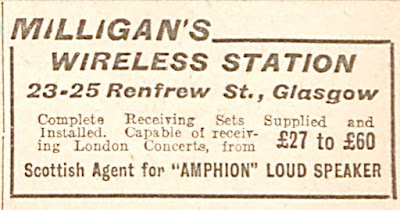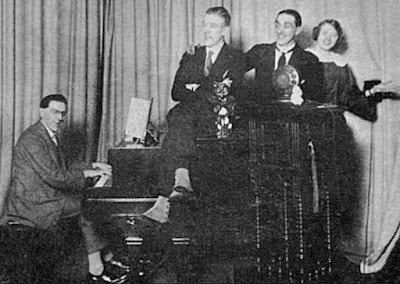Editors Note: On an episode of the excellent podcast BBCentury with Paul Kerensa, which is telling and celebrating the centenary of the BBC (although nothing officially to do with the BBC), an episode looked at the experimental stations in Scotland such as 2BP and 5MG and I was amazed to find that it was a Dublin man who was behind 5MG and so I began to research this important pioneers story. This is it. - Eddie Bohan, Radio Historian
A draper’s assistant, born on the Upper Rathmines Road, Dublin, would become both a pioneer in radio broadcasting in Scotland and pave the way for another giant of global communications, Ryanair, to gain a foothold in affordable air transportation into Scotland. Months before the newly formed British Broadcasting Company (as the Corporation was originally known) launched their official Glasgow radio station, 5SC, in March 1923, Frank Milligan provided the Glaswegians with their own radio station, becoming a pioneer before the arrival of the BBC.
Francis Marshall Milligan was born on July 5th 1883 at 111 Upper Rathmines Road, the eldest son of the seven children of Wicklow born accountant Andrew Mease[1] and Tipperary born Amelia Boardman. After a brief education, he began work as a drapery assistant in Rathmines but in February 1901 he joined the Imperial Yeomanry [2] of the British Army and found himself on the frontlines of the battlefields of the Boer War in South Africa. After being demobbed, he made his way to London and met and fell in love with Elise Adriene Barrett. Elise was better known as Elise Barone (b. London 1883 – d. Scotland 1971) and was an actress starring in silent movies such as ‘Tom Cringle in Jamaica’ in 1913 and ‘A Flirtation at Sea’ also that year. She also appeared in numerous, what became known as, cliff-hanger serials, an early form of soap opera. Her acting career ended when she married Frank in Paddington in July 1913.
The couple made their way
to Glasgow, where Frank, having learned about the use of wireless in South Africa,
opened a wireless sales business at 23-25 Renfrew Street in Glasgow. Milligan
then found a partner to help him expand his fledgling business in George
Garscadden, who ran a domestic appliance business at nearby 202 Bath Street in
the city. In October 1922, the two men gather the necessary equipment to
broadcast on the fourth floor of 141 Bath Street[3]. The Milligan and
Garscadden’s station would be known as 5MG (also known as Milligan’s Wireless
Station) and broadcast on 440m medium wave. At a of the meeting of the Wireless
Club held in the Scout Hall, Southbridge Street on Saturday October 14th
1922, it was revealed that a concert from Writtle[4] would be listened to,
‘Also,
a concert specially transmitted for the meeting by the direction of the demonstrator
Mr. F.M. Milligan FRGS from his own station.’
The first broadcast from 5MG took place from 7pm on Tuesday October 17th 1922[5].
For their opening
broadcasts the station broadcast gramophone records using a ‘Algraphone’. The ‘Algraphone’
was made between 1922 and 1926 by Alfred Graham & Co, who were better known
for their Amplion loudspeakers, for whom Milligan was the franchisee in
Glasgow. Live concerts began in the cramped studios with Herbert Carruthers on
piano and Garscadden’s daughter Kathleen singing. Kathleen later revealed,
‘I and my choir, in which I sang, and my
organist Mr
Carruthers were invited to
that little flat to come and experiment to see if we could send our voices
through the air. It was really a comical set-up with cables from the kitchen to
the dining room in the little flat, and a microphone like a soup-plate
suspended from the ceiling. And we played and we sang night after night, but
nothing happened But I'll never forget the night I was heard and my mother
heard me in Sauchiehall Street, and of course that was a miracle.’[6]
The station continued to entertain ever evening from 7pm with the
Glasgow Herald saying that,
‘The entertainment has been of first class quality’.[7]
"I was always in there, trying," she once told me. "Then one day I 'plunked' school to go to Glasgow and audition for a bigger contest at the Empire." That show, Brian Michie's ‘Youth Takes a Bow’, is part of history because of two teenagers who competed with Primrose. They were Eric Bartholomew and Ernest Wiseman, remembered today as Morecambe and Wise. The girl from Prestwick (where she lived for most of her life) had savoured an early taste of showbusiness, running around her father's embryonic radio station. Those years were recalled when she featured prominently on the BBC Scottish Home Service as a leading member of the Jimmy Logan/Stanley Baxter comedy series ‘It's All Yours’. Primrose joined in with all the show's gags, sketches and catchphrases. The series still well-remembered was an early landmark in a career that embraced music hall, seaside summer shows, revue, drama productions and a tour to North America with plays from Glasgow's Tron Theatre. Primrose also worked in films in London and, in-between the performing jobs, as a fashion show compere. More recently, in her sixth and seventh decades, 'Primmie' enjoyed the fun of team camaraderie in the studio and on Loch Lomond-side location, playing Mrs Woods, a villager of fictional Glendarroch, in popular Scottish soap Take High Road. She also took cameo roles in Rab C. Nesbitt and other TV series.”[8]
In early 1923 there was a buzz created into city as a second temporary station took to the airwaves when Marconi on behalf of the Daimler motor company launched a brief station 2BP to promote the sale of in car radios. On March 6th 1923, the BBC station 5SC came on the air in studios above Garscadden’s shop on Bath Street and using much of the equipment that had brought 5MG to the airwaves.
‘The BBC under Lord Reith kept such a tight
hold on the purse strings that the habit was difficult to break and employees
hesitated before requisitioning even a new pencil. Yet, in spite of such
restrictions, Auntie Kathleen in her day was a power in the land and will
always inhabit a special niche in the annals of broadcasting, along with Uncle
Mac (Derek McCulloch) who operated from London. For many years Kathleen's was
the best-known voice in Scotland, eagerly listened to in cot and castle. She
provided wholesome entertainment for myriads of young listeners—for old ones,
too’.
Kathleen Garscadden died in Glasgow on February 20th 1991.
The Milligan’s, once their station was closed and competition increased in the radio sales, moved to Prestwick where Frank was appointed the Provost of Prestwick. A Provost is the convenor of the local authority, the civic head and the lord-lieutenant of one of the principal cities of Scotland. In that position, after the end of the Second World War, he pushed hard for the former air base at Prestwick to adapted as an international airport. His persistence was rewarded and in his role as Provost was on hand to meet and greet famous celebrities including Princess Margaret in 1950 as she holidayed in Scotland and Queen Juliana of the Netherlands who stopped off as she made her way to the United States. Prestwick Airport also made global headlines when it is one of the few places in the UK where Elvis Presley landed.
Frank Milligan died on November 1st 1956[10].
[1]
Ancestry.com
[2] UK
Military Records, Kew Gardens
[3]
Scotland On Air
[4]
2MT
[5]
The Airdrie and Coatbridge Advertiser
[6] ‘Carrocher in Conversation', BBC Radio Scotland, 3 April
1980.
[7]
Glasgow Herald December 1922
[8]
The Stage August 26th 1999
[9]
February 19th 1990
[10]
The Stage trade newspaper.
Sources:
The Irish Newspaper Archives
The British Newspaper Archives
Ancestry.com
World Radio History
Scotland on the Air
B B Century & Paul Kerensa
Wireless World Magazine
Google Maps
RadioSix.com
British Pathe News
UK Archives Kew Gardens
BBC Scotland











No comments:
Post a Comment